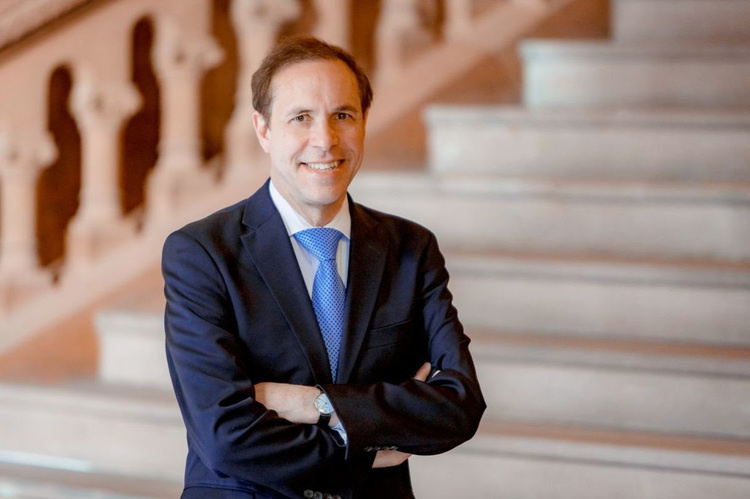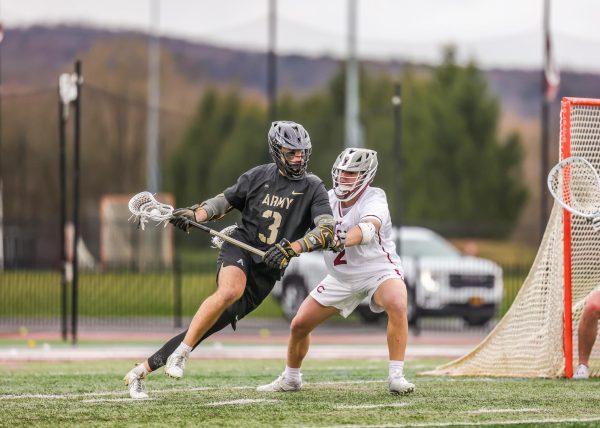New York State Commissioner of Health Dr. Howard Zucker Speaks with the Colgate Community
Dr. Howard Zucker, New York State Commissioner of Health met with Colgate students and faculty to discuss New York State’s policy response to COVID-19.
At the event held Thursday, Sept. 10, Dr. Zucker discussed the relationship between public policy and disease control in-depth. He explained how New York State’s response is not just directed towards COVID-19, but towards improving the public health infrastructure in general to prevent another crisis in the future.
Senior Ellie Schonberg felt the event was a great opportunity for Colgate students to learn about the importance of public health on campus this semester.
“Dr. Zucker made it clear that public health will always be important. At Colgate, for example, we have put a lot of trust in the University, and I think we can see now that strong policy, trust in students and the University and concern for others in everyday life is really paying off,” Schonberg said.
According to the University’s web page, the event was organized by Colgate University’s Lampert Institute for Civic and Global Affairs, an organization founded in 2007 by alumnus Ed Lampert ‘62, P’10 and Robin Lampert P’10 to bring diverse perspectives to campus and to support the study of civic affairs. Associate Professor of Political Science lllan Nam is the Director of the Lampert Institute and encouraged her classes to attend the lecture.
Junior Johna Joseph, a student of Professor Nam, believes this discussion was an important way to start off the semester.
“I think it was interesting to see the bureaucratic side of the COVID-19 pandemic. As a nation, we handled it poorly but New York state was lucky to have competent individuals like Dr. Howard Zucker and Gov. Cuomo who prioritized lives over public favor. It wasn’t all straightforward. The administration is dealing with as much confusion about the situation as us and is constantly re-evaluating its position. It’s hard but not impossible. It takes cohesion and a unified effort,” Joseph said.
Joseph explained that Dr. Zucker went into detail on both state and national events and how these entities have affected one another during the pandemic.
“Dr. Zucker mentioned how [New York] State failed at a federal level and the importance of symbolism when you are representing the head of a nation. The president not wearing a mask until very late in the game after many mortalities led to many downplaying the severity of the situation. It made it increasingly more difficult to combat this issue once the health of a nation became a political issue,” Joseph said.
Schonberg, a pre-med student concentrating in political science, is from upstate N.Y. and witnessed the challenges posed by a lack of adequate public health resources in her rural community first-hand when she started contact tracing last spring for her local health department.
“Public health is really interesting to me because of my interest in both medicine and policy. I’m doing an independent study this semester on epidemiology of COVID- 19 in parts of New York State, the effects policy can have on disease spread and what demographics are most heavily affected by the disease. The talk was very relevant to me for these reasons, and I am so glad the Lampert Institute was able to have him [talk] this fall,” Schonberg said.
Schonberg also expressed her beliefs on how the public health landscape should change in the future to better prepare for possible unforeseen circumstances like the COVID-19 pandemic.
“I think it is clear that we were not ready for this sort of thing to happen, and in a lot of places we are now realizing we could’ve used a lot more manpower [and] more money. If there had been more resources already in public health departments, in more rural areas, in NYS in general and even across the country, things might have gone differently,” Schonberg said. “I think we have a different view of public health now, and how important it is for our future. I think disease prevention is not just something we can forget about. [COVID-19] is going to be a part of our lives for the distant future, and I think the fact that it has been so life-altering for people of every generation will make us see these issues in a different light. Public health is clearly an area we cannot slack in, even when disease outbreaks are not occurring.”
During the discussion, Schonberg asked Dr. Zucker a question about whether public health infrastructure, including funding, personnel and programs, will be expanded specifically in rural areas such as her hometown.
“I think he did a really good job handling that question. I thought the point of comparison between a pre-9/11, post-9/11 world and a pre-COVID [and] post-COVID world, along with the response to public health, was really interesting… We are going to have lived in a pre-COVID world and live in a post-COVID world and, in the post-COVID world, we are going to put a lot of energy into public health simply because we know that if we don’t, really bad things can and will happen when we are least expecting it,” Schonberg said. “The more people, more manpower, more resources and more respect [public health departments] and issues can get really makes a big difference, and will save more lives than we can count.”







